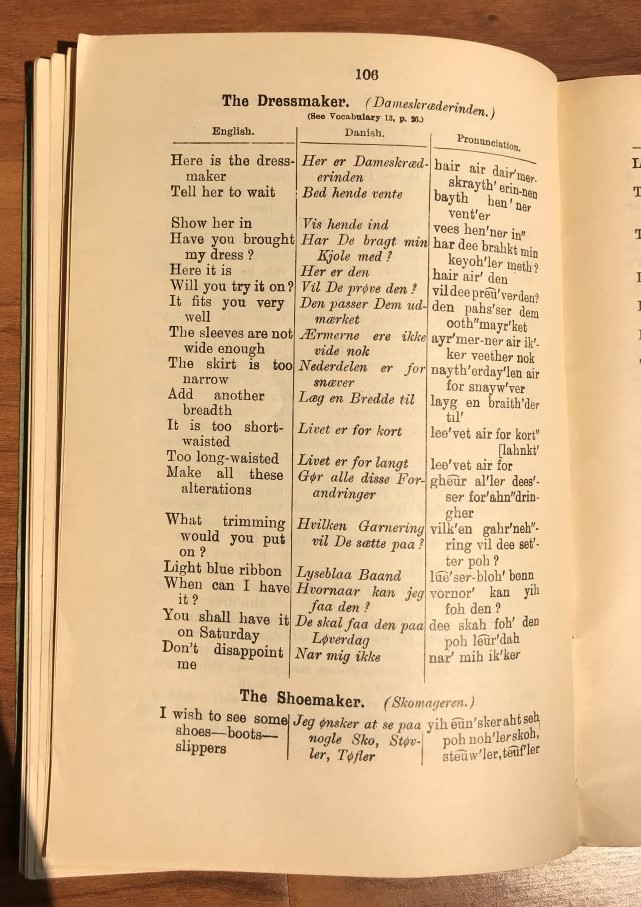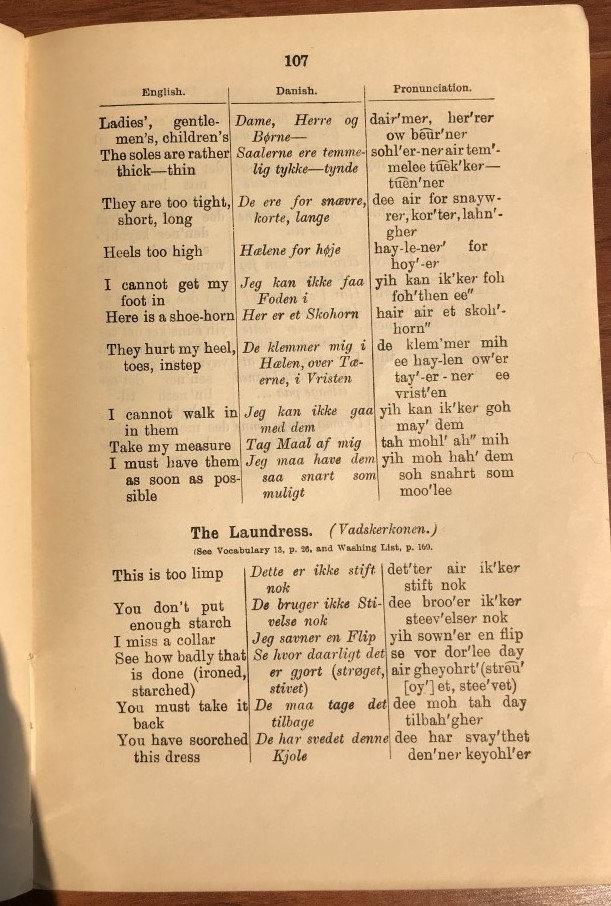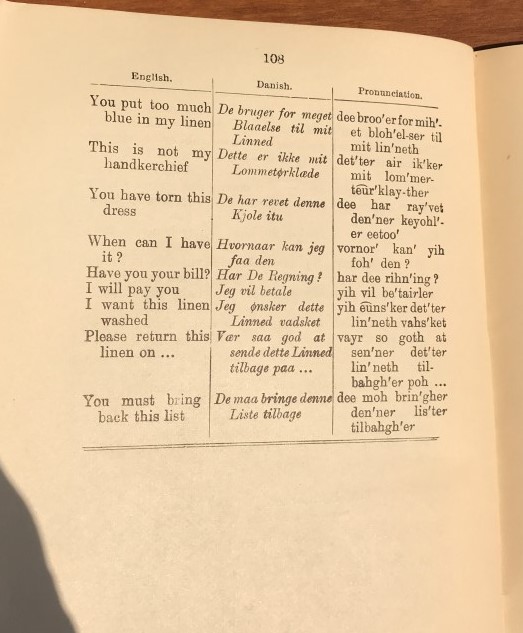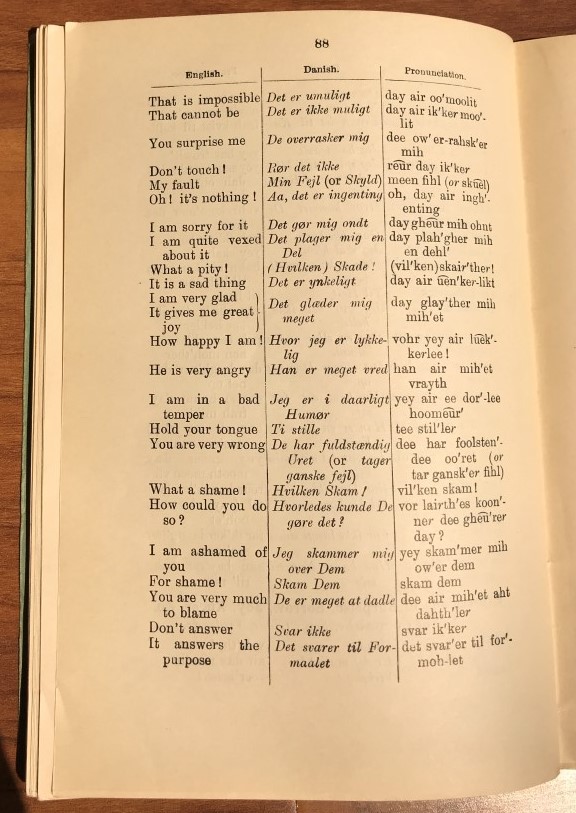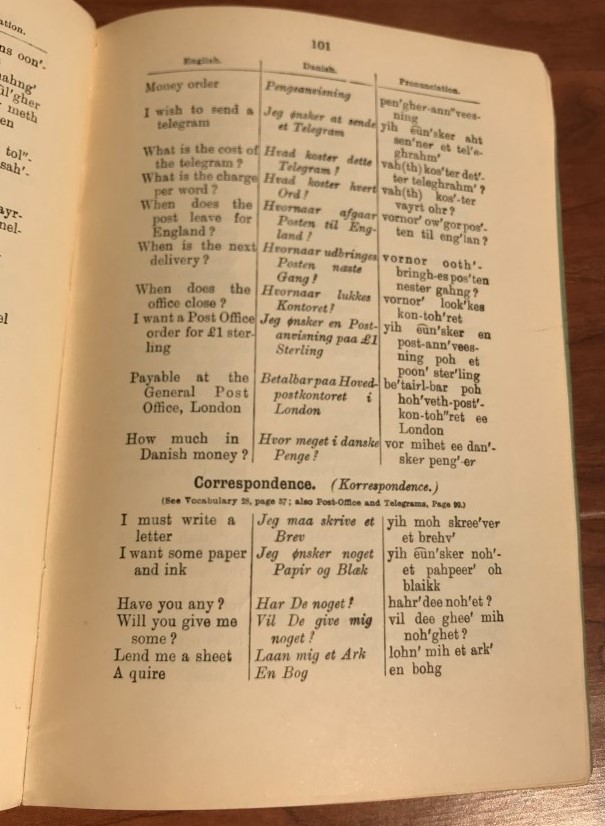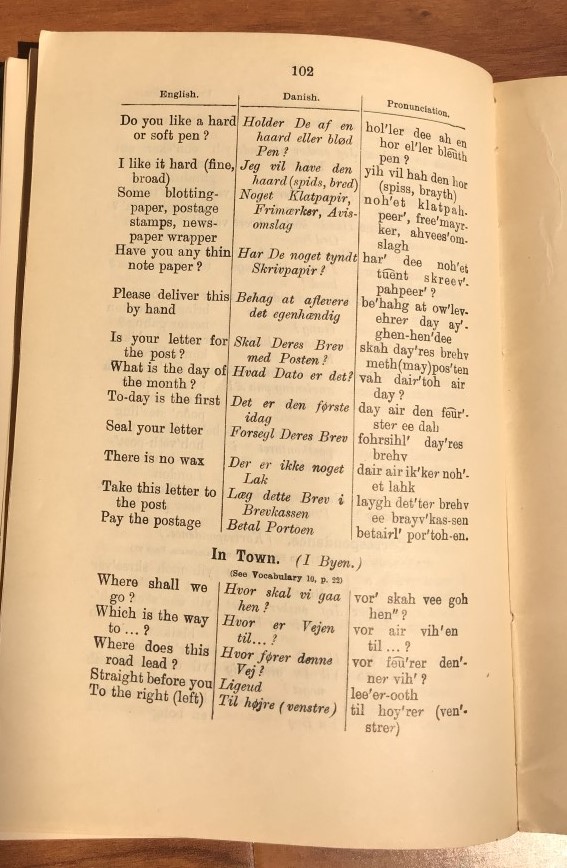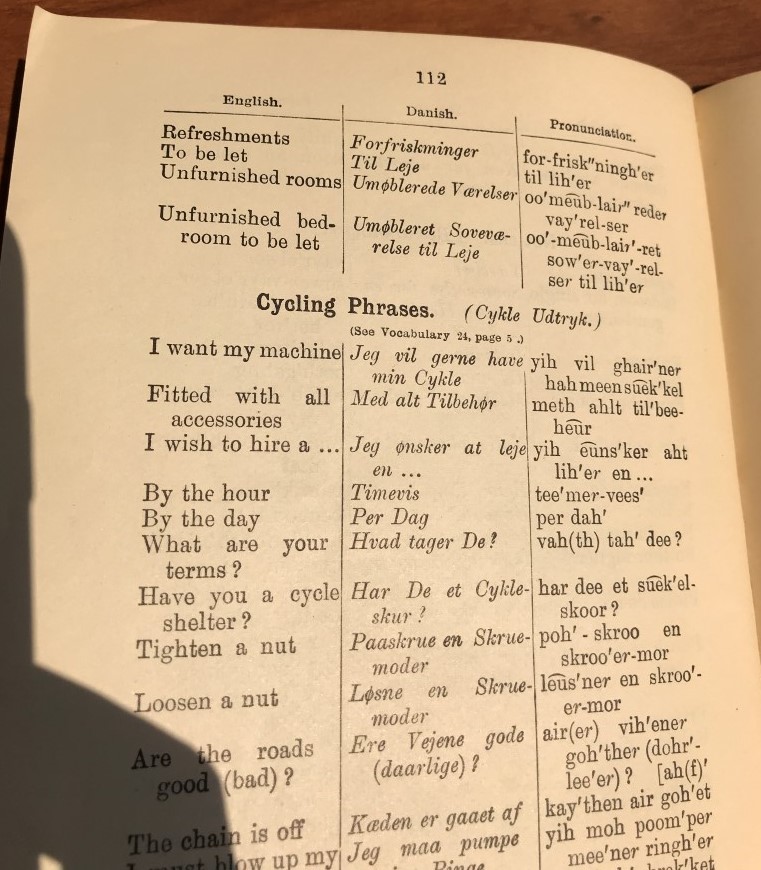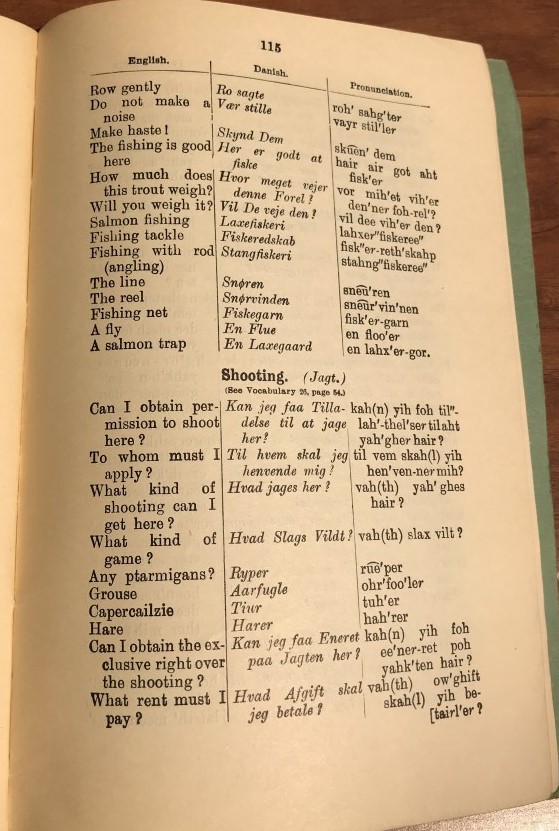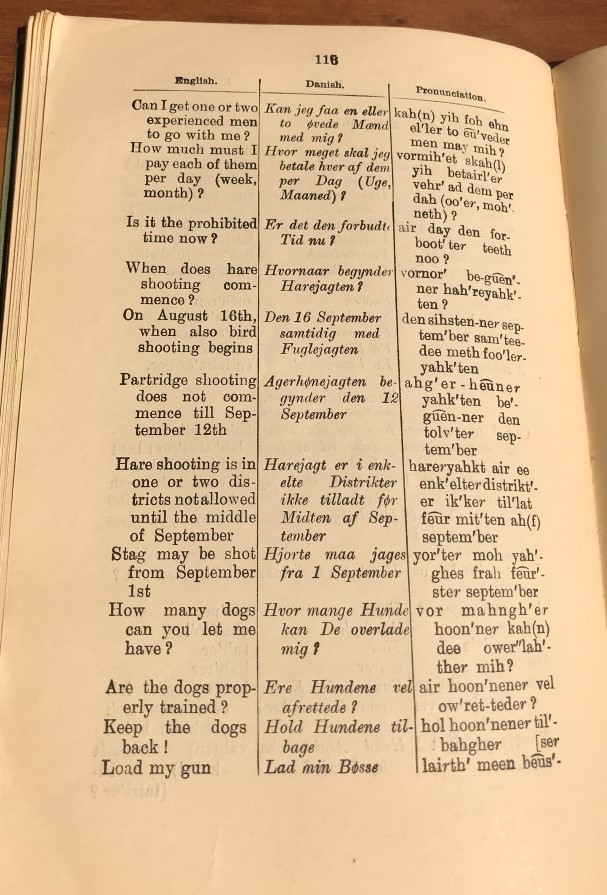One of my favourite genres of book is that of the really old foreign-language phrasebook. They’re a thin but illuminating window into so many things: who is travelling, and why; who they are talking to, and why; what expectations they have. If there isn’t a PhD-thesis-turned-monograph on the subject, there certainly should be. My fondness is much shallower: the de-contextualised expectations of the historical traveller can be extremely funny.
From the perspective of having a jolly good laugh, older phrasebooks are to be preferred. We aren’t interested in the modern phrasebooks for the modern city-breaker, or the hippies’ guides to Asia, or even the WW2/occupation-era phrasebooks for military personnel moving about the world. On the other hand, too far back, and the only people travelling are traders and diplomats, whose phrasebooks are too pragmatic for much comedy. No, for best results, we want phrasebooks from the height of (the British) empire, the early twentieth century.
I recently acquired a perfect specimen: Marlborough’s Danish, Self-Taught, by W. F. Harvey, M.A. Undated, but the third edition of the “Self-Taught” series seems to have been published in the early 1930s.
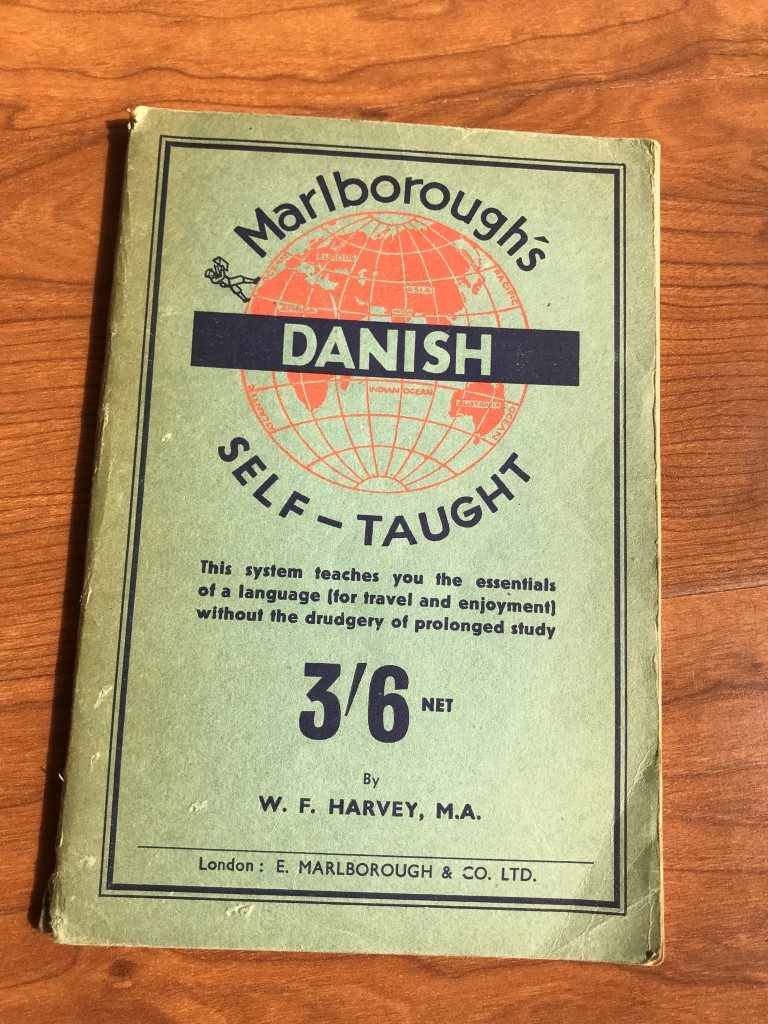
Some of the words chosen for inclusion in the vocabulary section are… quite different to those of modern phrasebooks. For example, there is a long section on “Fruit, Trees, Flowers, and Vegetables”, including such everyday examples as vegetable-marrow, myrtle, lily-of-the-valley. There is a page for “Minerals and Metals”, in case one needs to discuss agate, gravel, or the carbuncle. The page for “Mankind; Relations”, includes, as well as the expected familial relation words, translations for “a dwarf”, “a hunchback”, “a giant”. Let’s assume these are for translating fairy-tales.
The choice of phrases to include in each section reveals the intended audience to be the more well-heeled traveller. Some selections:
| English | Danish | Pronunciation |
| I want a first-class ticket to … | Jeg ⌀nsker en f⌀rste Klasses Billet til … | yey eun’sker en feur’ster klahs’ses billet’ til … |
| Please give him my card | Vær saa god at give ham mit Kort | vayr soh goh aht gee(ver) ham mit kort |
| Which is the best hotel? | Hvilket er det bedste Hotel? | vil’ket air day bester hohtel’? |
| Can I obtain the exclusive right over the shooting? | Kan jeg faa Eneret paa Jagten her? | kah(n) ih foh ee’ner-ret poh yahk’ten hair? |
In fact, the entire “Shooting” section is pretty great. What kind of shooting can I get here? Any Capercailzie? Let me have a shoot with your gun. How many dogs can you let me have? HOW MANY DOGS? Are the dogs properly trained?? Keep the dogs back! HOL HOON’NENER TIL’-BAHGHER!!
Getting the worst of the upper-class entitlement are the domestic staff. The book has sections for conversations with The Dressmaker, The Shoemaker, and The Laundress. Albeit there are more different ways for these experiences to go badly than to go well, but the book has no suggestions for “good job with that dress”, or “here is a gratuity, my good man”. Instead there are a diverse collection of ways to complain about the service received.
| English | Danish | Pronunciation |
| Don’t disappoint me | Nar mig ikke | nar’ mih ik’ker |
| They hurt my toes | De klemmer mig over Tæerne | de klem’mer mih ee hay-len ow’er tay’-er-ner ee vrist’en |
| This is too limp | Dette er ikke stift nok | det’ter air ik’ker stift nok |
| See how badly that is done | Se hvor daarligt det er gjort | se vor dor’lee day air gheyohrt’ |
| You must take it back | Da maa tage det tilbage | dee moh tah day tilbah’gher |
| This is not my handkerchief | Dette er ikke mit Lommet⌀rklæde | det’ter air ik’ker mit lom’mer-tuer’klay-ther |
| You have torn my dress | De har revet denne Kjole itu | dee har ray’vet den’ner keyohl’-er eetoo’ |
It is also important to be able to express complaints more generally. The section on “Expressions of Surprise, Sorrow, Joy and Anger, &c” has got you covered.

| English | Danish | Pronunciation |
| Indeed! | Virkelig! | veer’kelee! |
| Don’t touch! | R⌀r det ikke | reur day ik’ker |
| I am quite vexed about it | Det plager mig en Del | day plah’gher mih en dehl’ |
| I am in a bad temper | Jeg er i daarligt Hum⌀r | yey air ee dor’lee hoomeur’ |
| Hold your tongue | Ti stille | tee stil’ler |
| You are very wrong | De har fuldstændig Uret | dee har foolsten’dee oo’ret |
| How could you do so? | Hvorledes kunde De g⌀re det? | vor lairth’es koon’ner dee gheu’rer day? |
| I am ashamed of you | Jeg skammer mig over Dem | yey skam’mer mih ow’er dem |
| For shame! | Skam Dem | skam dem |
| You are very much to blame | De er meget at dadle | dee air mih’et aht dahth’ler |
If you would like your own copy, so that you too can learn to speak Danish like an entitled Britisher from 90 years ago, there is currently a copy available on Etsy.
